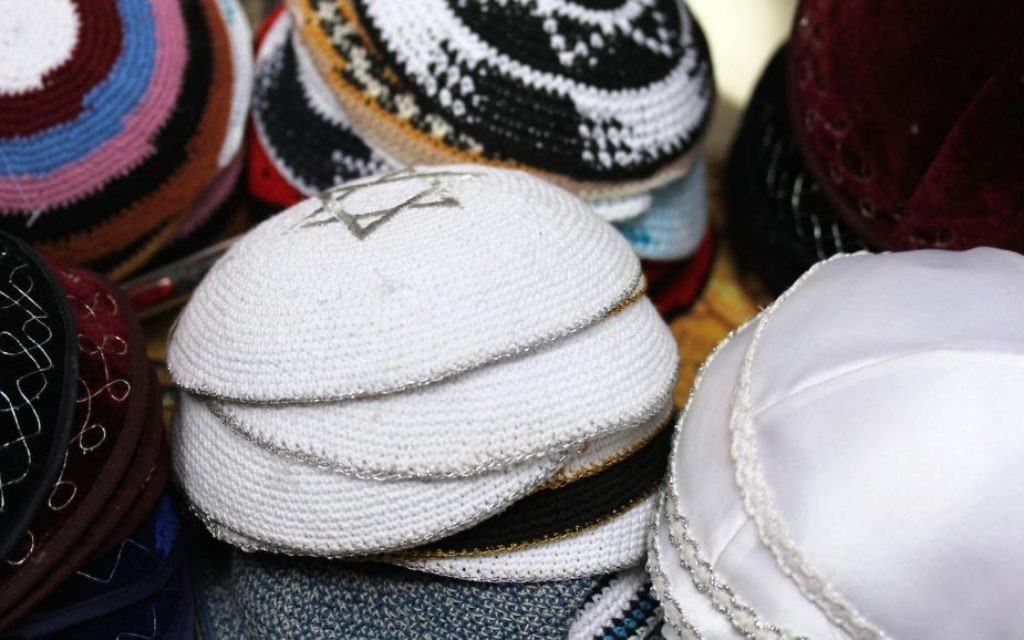Wearing a Kippah Brings Its Rewards
A simple public display of Jewish identity opens a world of connections.
My grandfather called it a yarmulke, my aunts called it a skullcap, and now it seems that everybody calls it a kippah. Here are three kippah anecdotes.
We lived in Israel during the heady year after the Six-Day War. Afterward, we were determined to identify ourselves as Jews wherever we went, sensing somehow that it would make a difference in the world.
We left Israel and traveled in 1968. On a train between Paris and London, we were approached by an excited man, who explained that he was a Holocaust survivor. He thanked my husband for wearing his large, knitted kippah publicly, declaring his Jewish identity without saying a word.
Get The AJT Newsletter by email and never miss our top stories Free Sign Up
Wherever we went, we were surprised by men and women, many of them survivors, who wanted to talk to us. Zvi’s unmistakable kippah was the spark that ignited fires of connection.
That was 1968. We all know that things have changed for men wearing a kippah in Europe. But in Atlanta, in 2017, Zvi’s kippah serves its purpose, still opening conversations with interesting strangers.
We were sitting in the waiting room at a Kaiser Permanente facility, minding our own business. A man came up to Zvi, asking, “What shul do you belong to?” He had spotted my husband’s black kippah.
We began to converse, and soon a second man joined us. A lively discussion about synagogues, day schools, old Atlanta families, Jewish businesses and neighborhoods, immigration, and, of course, the economy went on and on. We learned a lot, discovered mutual concerns and ended up exchanging contact information.
Later, when Zvi was with the doctor, a woman came over to me: “My friend and I overheard part of your conversation. It’s great to see men wearing yarmulkes in public these days. It didn’t used to be like that.”
We, too, got into a lengthy, meandering conversation, and we learned that we have many common interests, support the same causes and even know some of the same people. Zvi’s kippah had provoked a second round of connection.
A multigenerational family had been sitting nearby. One of the men leaned over and said, “You’re Jewish, right?” I was expecting another Jew to identify himself, but not this time.
“Yes, why do you ask?”
“How do all Jews know each other?” he wondered.
“We don’t all know each other,” I answered, “but because my husband wears a skullcap, other Jews recognize it and feel related to him in a unique way.”
The man nodded, and I felt, for want of a better word, proud.
A week later, Zvi had an appointment at a different Kaiser facility. Because the office is near Costco, we decided to stop there on the way home. It was Thursday afternoon, and we could do some shopping for Shabbat. We showed our card to the African-American greeter, who welcomed us with “Shalom aleichem! Mah nishma?” (“What’s new?” or “How’s it going?”)
“You speak Hebrew?” I asked. “Are you Jewish?”
I saw his name tag: “Abraham.”
“I’m not Jewish yet,” he answered, turning to Zvi. “I study Hebrew. I knew you’d understand me because you wear a kippah.”
Countless Jews who don’t cover their heads speak Hebrew, and just as many Jews who cover their heads don’t speak Hebrew, but it wasn’t the time or place to discuss Jewish demographics. Zvi and I were simply delighted to meet Abraham.
“Your accent is very good,” Zvi said as we walked away.
“Todah rabbah (thanks a lot)! Shabbat shalom!” Abraham called after us.
The following day, Friday, Zvi made a quick trip to Publix. It was getting close to Shabbat, and he was in a hurry. But he was stopped by a man driving an old, rusted car.
The driver showed him a kippah and asked him if he wanted to buy it, claiming that his family was stranded in Atlanta without any money. Zvi gave him a few dollars.
“I knew it was a scam, and my kippah identified me as a likely mark,” Zvi said. “However, I gave some tzedakah, and I rescued a kippah!”
Remember our decision, 50 years ago, to identify ourselves as Jews? Zvi continues to get what he wished for.





comments